The CRM market is booming, with its market size expected to reach $128.97 billion by 2028. For startups, a good CRM is essential as a centralized system to manage customer relations and sales processes — especially when they have big dreams backed by tight budgets.
In this article, we’ll explain the basics of CRM software for startups, how growing businesses can benefit from these solutions, and how to use monday CRM as a guide for what to look for in a CRM platform.
Do startups need a CRM?
In a word? Yes.
Startups are in a constant state of growth and iteration, and require a system for quick and easy fine-tuning of their sales, marketing, and customer service processes.
A customer relationship management platform is the perfect solution as it simplifies the process of monitoring and managing relationships throughout the entire customer lifecycle. Additionally, some 40% of sales professionals believe their CRM is “very or extremely effective” in achieving alignment between sales and marketing teams.
What are the benefits of using a CRM for startups?
A CRM system is an invaluable resource that can help startups meet those needs in many ways. Here are a few:
1. Nurture strong customer relationships from the start
Startups need a robust CRM with reminders, quick scheduling, and space to make notes about potential customers to ensure effective conversations that lead them down the sales funnel to convert. For example, monday CRM includes activity management features to log any call or email communication and integrates with Gmail for email tracking.
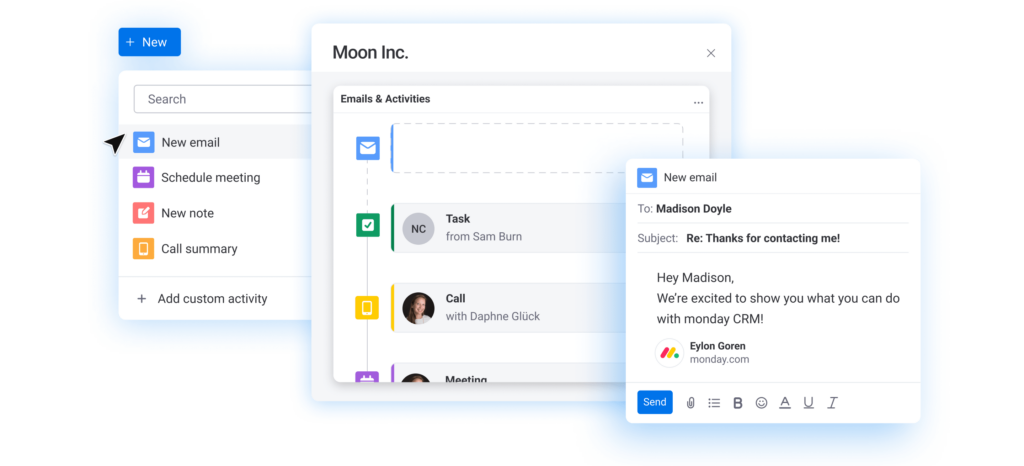
2. Provide excellent customer experiences
74% of consumers define brand loyalty more about feeling valued and understood rather than being offered discounts or perks. Deliver excellent customer experiences using a CRM that helps you organize and analyze your customer data, from tailored messages to content and cadences.
3. Centralize data
Store all customer data in a central location to improve the company’s data organization and data flow. Effective data management is critical for a startup since it dictates decisions for current and upcoming projects. Seamlessly import your data into monday CRM and connect with existing data to stay on top of the information that matters.
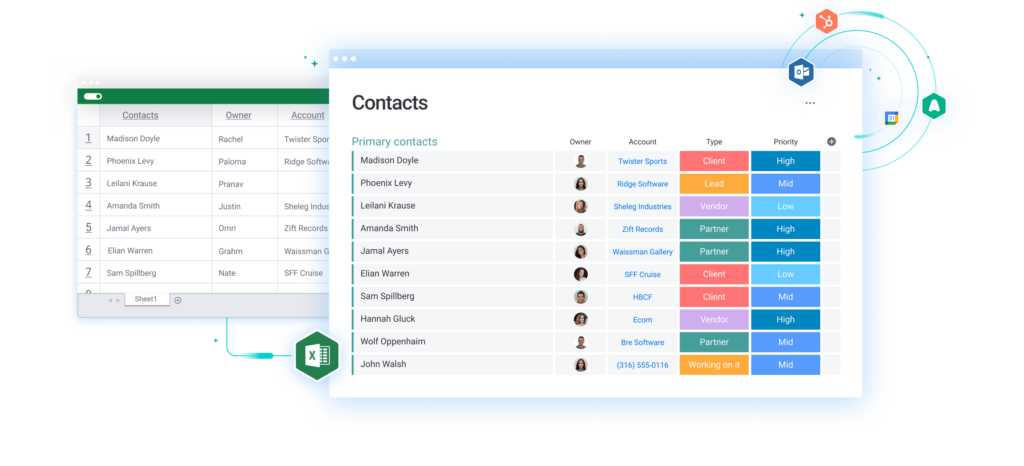
4. Provide clarity within your team
A simple CRM makes it easy for your employees to know exactly where to find customer information or essential updates related to the sales cycle. That could be anything from customer lifecycle stages and CRM bug reporting to deal information or new feature releases they can pitch to potential customers.
5. Streamline the sales process
A startup CRM delivers visibility into your entire sales pipeline by sorting sales, labeling opportunities, and grouping customers as you please. With an advanced platform like monday CRM, you can use custom dashboards to quickly view deal progress, sales figures, team performance, and more.
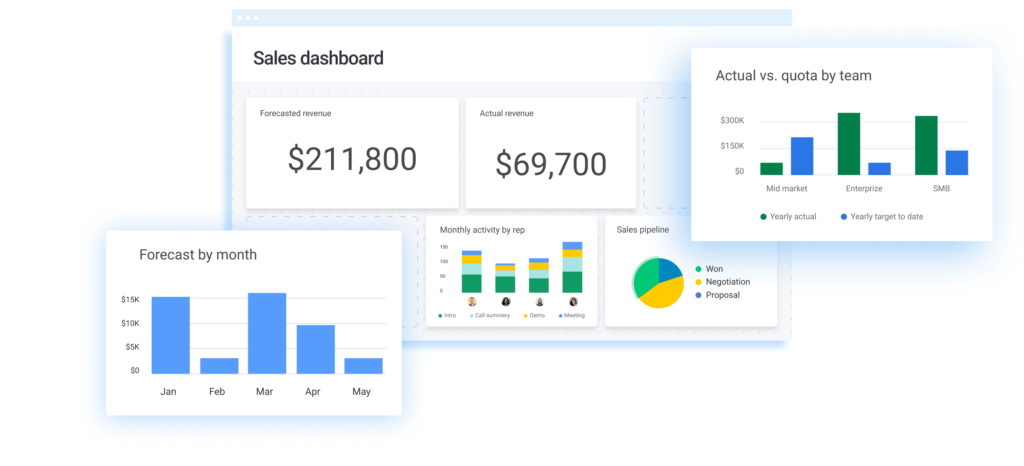
6. Better scalability and growth preparation
As your startup grows, so will the size of your sales and customer service teams. Your CRM will scale with your business, giving new team members instant access to sales processes and product information. Learn more about how monday CRM will grow alongside your business by signing up for a free trial below.
6 best CRM for startups
Wondering which CRM to explore? Check out these popular CRMs for startups ranked highest to lowest, according to G2 software review scores.
1. monday CRM
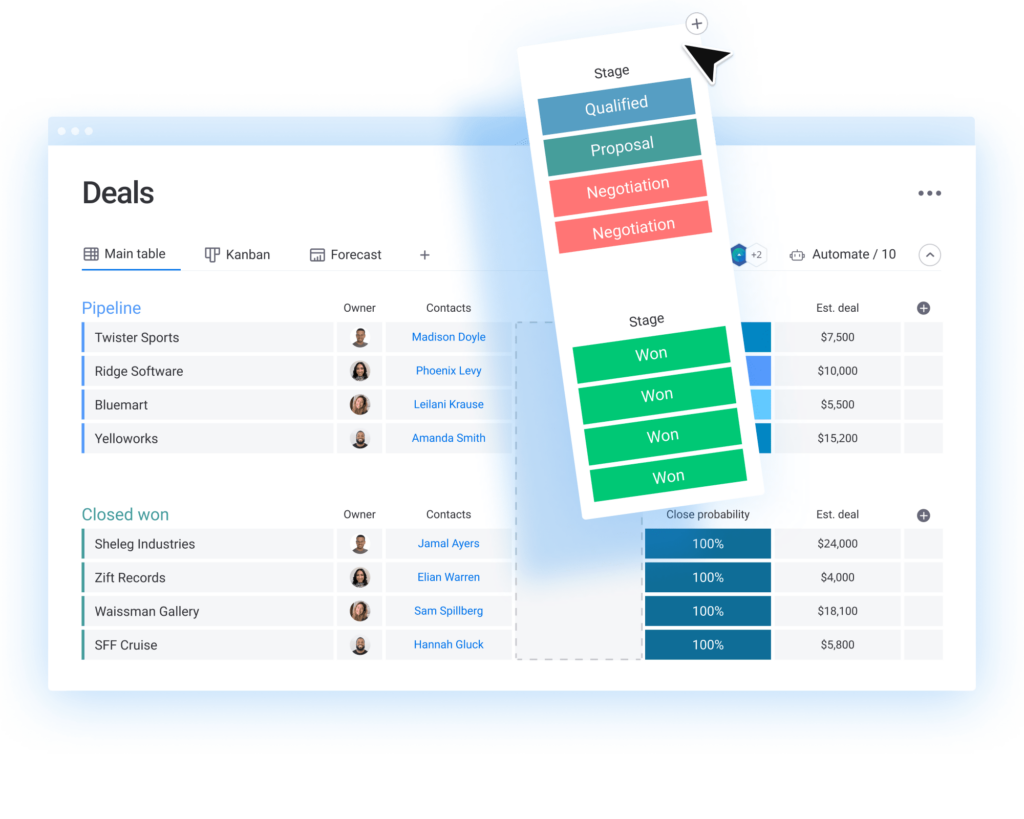
monday CRM gives sales and marketing teams real-time visibility into their CRM pipeline. It offers a rich variety of features you soon won’t be able to operate without, including:
- Integrations: monday CRM integrates with 72+ third-party apps like Google Drive, Slack, Excel, Mailchimp, Dropbox, and more, to radically reduce the time spent flicking between tools.
- Mobile access: Give your sales and marketing teams access to our CRM on the go from either iOS or Android devices.
- User-friendly interface: It’s always easy to find your data and present it just how you want with our intuitive CRM that offers 27 available views.
Drawbacks: There’s no free forever plan with monday CRM, but we offer highly competitive premium packages. Once you take a trial, you’ll quickly see how much your startup will benefit from this small monthly investment.
Pricing: monday CRM offers the below pricing plans. The Basic and Pro are most likely to suit a startup:
- Basic: from $12 per seat per month
- Standard: from $17 per seat per month
- Pro: from $28 per seat per month
- Enterprise: custom quotes available
G2 rating: monday CRM receives 4.6 out of 5 on G2’s software review platform, and is the highest score on our list. Take a free 14-day trial of our highly-recommended CRM by signing up below.
2. HubSpot
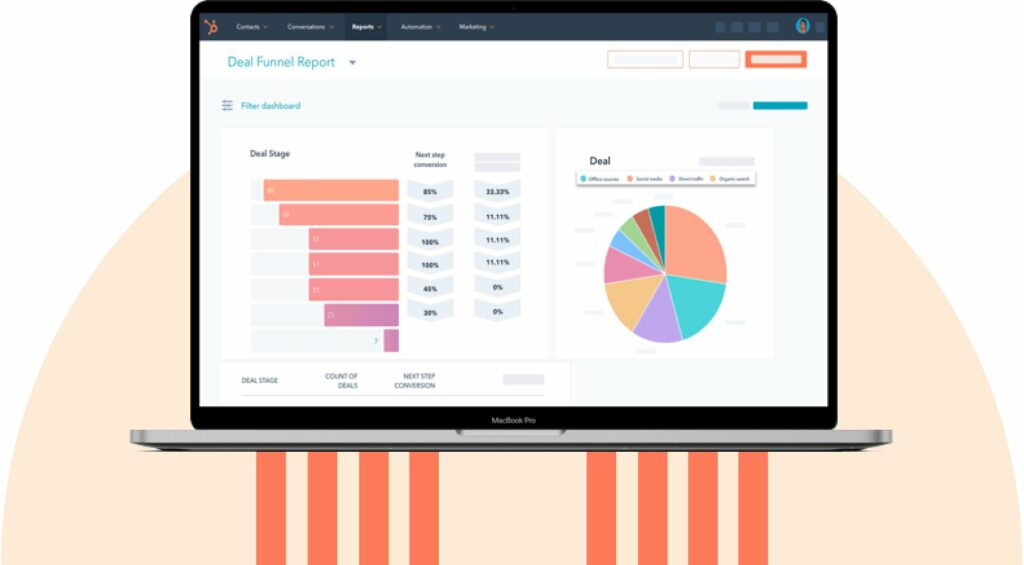
Hubspot is one of the best-known CRMs for startups and comes with a suite of features that can help you quickly build your customer base.
- Marketing automation: Create campaigns to keep track of leads and customers.
- Sales dashboard: Generate deals by viewing key insights.
- Analytics: Be proactive by making informed decisions based on data.
Drawbacks: The CRM features available on the free plan are pretty basic, even for a startup. For example, goal tracking and conversation routing aren’t available at this level.
Pricing: HubSpot offers four pricing plans, as follows:
- Free: $0
- Sales Hub Starter: $15 per user per month
- Sales Hub Professional: $90 per user per month
- Sales Hub Enterprise: $150 per user per month
G2 rating: HubSpot scores 4.4 out of 5 on G2’s software review platform, which is 0.2 lower than monday CRM.
3. Salesforce Essentials
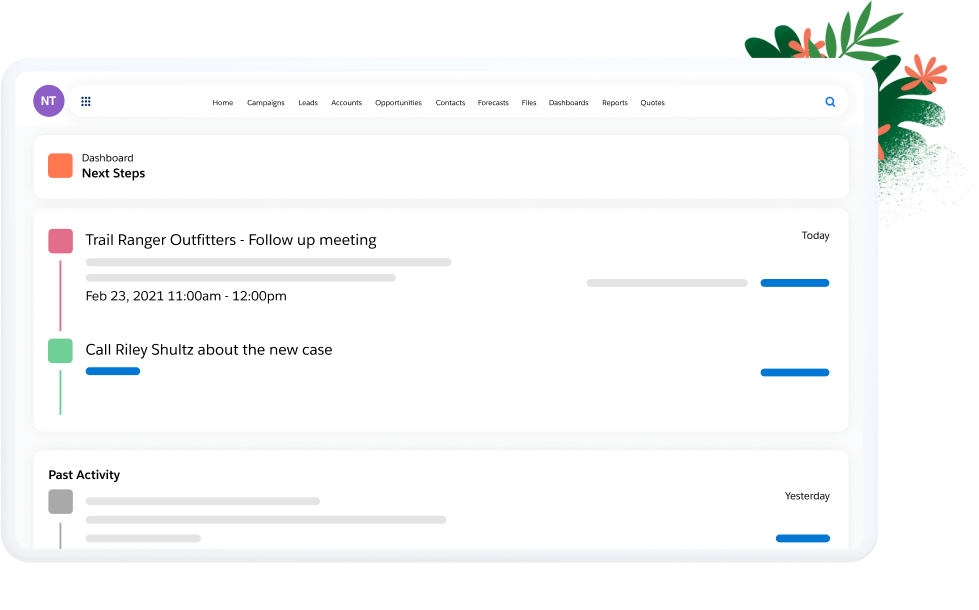
Salesforce CRM is likely too pricey for startups, which is where the stripped-back Salesforce Essentials may be more appealing. It has fewer features, but there’s always the option to upgrade to the full version when your growing business needs more bells and whistles. Expect the following as part of the Essentials package:
- Collaboration: Communicate with up to 10 other users.
- Integrations: Connect with other tools in your tech stack, although only a limited selection is available.
- Dashboard overview: Track sales and forecast upcoming figures from a central location.
Drawbacks: Reviews highlight Salesforce Essentials as difficult to set up and lacking basic functionality expected from a CRM. One software reviewer writes, “$3,200 wasted because of too many challenges in implementation,” while another user points out, “Salesforce Essentials lacks key functions like quoting, custom opportunities tab, ability to configure home page to see most-used widgets and create reports that have meaningful data.”
Pricing: Salesforce Essentials costs $25 per user per month.
G2 rating: Salesforce scores 4.3 out of 5, which is 0.3 lower than monday CRM.
4. Pipedrive
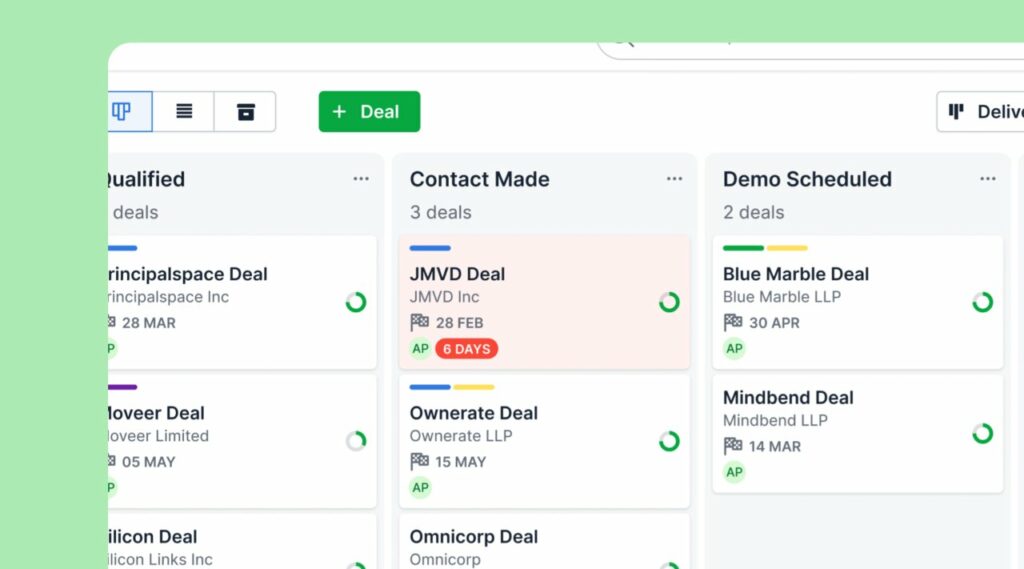
Pipedrive was created with startups and growing businesses in mind. It offers:
- Sales and contact management: Track deals and communicate with leads and customers.
- Intuitive interface: Hit the ground running with a platform that’s easy to set up.
- Customizable pipelines: Tailor to your specific workflows and see the details that matter most to you.
Drawbacks: Pipedrive doesn’t offer a free plan, and its paid packages are significantly more expensive than others, such as monday CRM.
Pricing: There are five pricing plans, with the Essential and Advanced options most suitable for a startup.
- Essential: from $14 per user per month
- Advanced: from $24 per user per month
- Professional: from $49 per user per month
- Power: from $64 per user per month
- Enterprise: from $99 per user per month
G2 rating: Pipedrive scores 4.2 out of 5 on G2’s software review platform, which is 0.4 lower than monday CRM.
5. Insightly
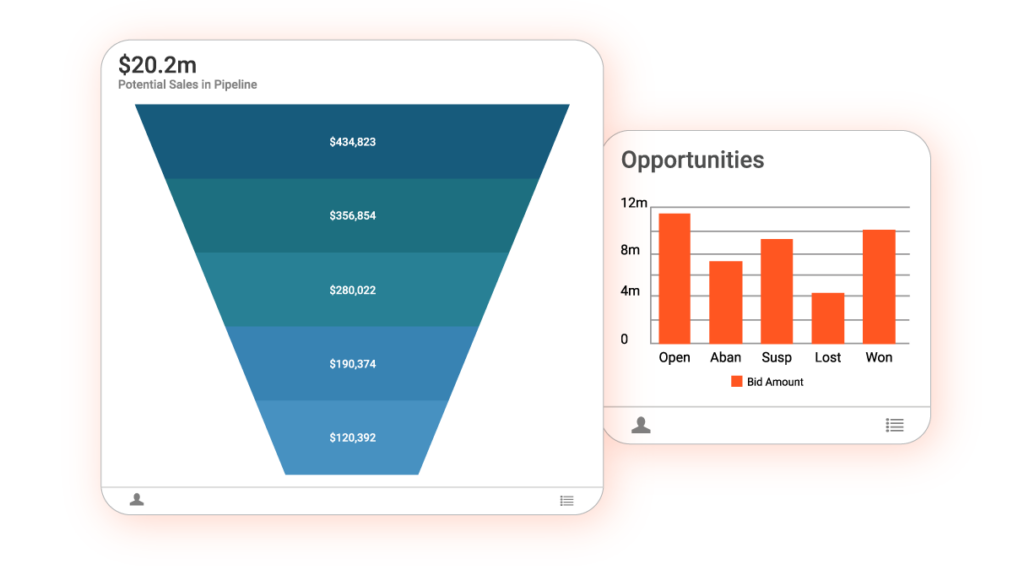
Insightly focuses more on project management than sales but has flexible features that could work for startups that need to manage leads and customers. These include:
- Milestone tracking: Create project deadlines and goals, then assess progress.
- Calendar syncing: Never miss an appointment with integrations to Google Calendar.
- In-built email: Write, send, and track email communications from your CRM.
Drawbacks: Insightly can be difficult to get to grips with, and it won’t meet the needs of some startups. One software reviewer mentions, “The tool does 1/3rd of what other marketing automation tools do, at the same cost. The CRM is also bare bones. Searching is challenging, reporting usually requires downloading to Excel and piecing things together, and data syncing is not the norm.”
Pricing: There are three pricing plans available, as follows:
- Plus: $29 per user per month
- Professional: $49 per user per month
- Enterprise: $99 per user per month
G2 rating: Insightly scores 4.2 out of 5, which is 0.4 lower than monday CRM on G2’s software review platform.
6. Zoho CRM
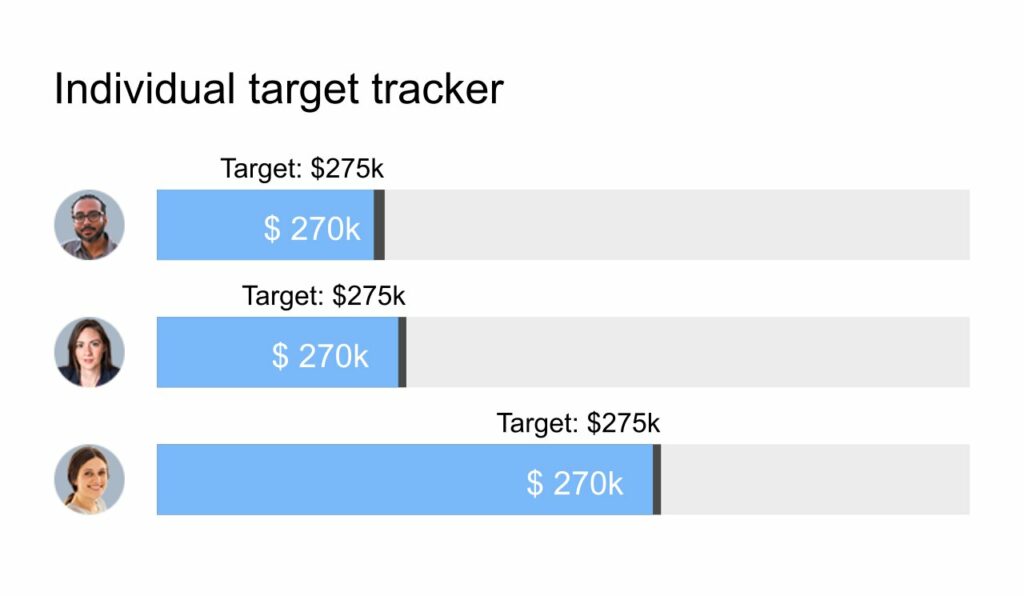
Zoho CRM is aimed at super-lean startups on shoestring budgets. It offers features such as:
- Lead generation tools: Generate leads from a range of sources, then nurture and convert them.
- Canvas design studio: Design your own interface using a drag-and-drop editor.
- Centralized communication channels: Receive, read, manage, and respond to messages within your CRM. These include emails, live chat messages, phone conversations, and social interactions.
Drawbacks: If you’re already using other Zoho products, then using this CRM may make sense. But prepare for a steep learning curve to gain the full CRM experience, as it’s known to be complicated. One software reviewer highlights the things they dislike the most about the product: “The amount of money I’ve put in, the time it has taken, the complexity, the UI, the UX, the support, the difficulty in getting the simplest things done.”
Pricing: Zoho CRM offers five pricing plans, as follows:
- Free: $0
- Standard: $14 per user per month
- Professional: $23 per user per month
- Enterprise: $40 per user per month
- Ultimate: $52 per user per month
G2 rating: Zoho scores 4.1 out of 5, according to G2’s software review platform. This is 0.5 lower than monday CRM.
Top features of a startup CRM
Startups can waste money and time hopping from one CRM tool to the next. Narrow down your search for the most suitable platform by considering these seven key features found in the best CRM for startups:
1. Ease of use
As a startup, you might have a lot of key players wearing multiple hats. Pick a CRM that isn’t a major onboarding feat for both sales reps and marketing designers. There’s no steep learning curve with monday CRM — everything is right where your team needs it.
Customer information, notes, progress on deals, call schedules, etc., are on one screen and neatly divided to avoid confusion. Moreover, monday CRM lets you create multiple boards for customer projects, sales activity, marketing campaigns, etc., and link them as you prefer. Seamless navigation between different boards and an intuitive UI also helps startups boost team collaboration.
2. Automation
Hubspot found that 61% of overperforming leaders use their CRM to automate parts of their sales process vs. 46% of underperforming leaders. Join the top flight by automating mundane low-impact tasks in your sales process, so your team members can focus on the important ones that drive growth for your organization.
monday CRM uses a simple “If X, then Y “logic, where users can customize both parameters to suit their needs. For example, you can automatically email team members when a due date is approaching.

3. Mobile CRM app
There are over 7 billion mobile phone users with one thing in common — they expect to receive a good user experience on any device. Your startup CRM needs to work on multiple devices, so your sales, marketing, and customer service teams have all the information they need wherever they are. This is especially important in the current scenario, where more and more employees work from home or if you have sales reps based in multiple regions. A mobile CRM like monday CRM allows your team to seamlessly log calls on the go ensuring no lost information and giving you more time to close leads.
4. Dashboards
Analytics plays a significant role in customer relationship management. This is how you discover data related to your Key Performance Indicators (KPIs).With an all-in-one visual dashboard, analyze sales boards to find:
- the top-performing sales rep for the month
- how many deals are in progress
- how many need to be completed
- which customer service reps get the best feedback.
monday CRM provides all these insights and more to help startups create a professional plan for current and future campaigns.
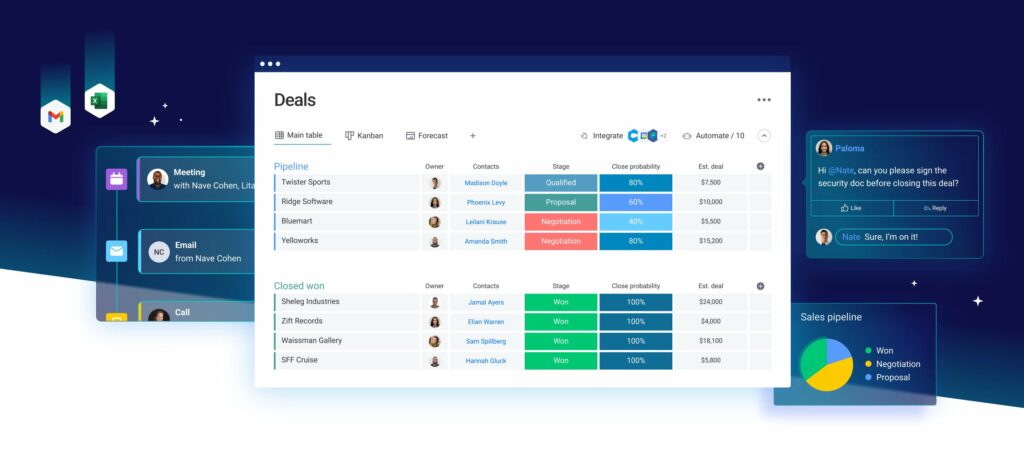
5. Integrations
Choose a startup CRM that integrates with all the other apps you’re working with, resulting in a cohesive, collaborative workspace. monday CRM offers 72+ integrations, including Gmail, Slack, and Dropbox, so you can get all your work done on one platform.

6. Budget-friendly
Startups can’t afford to blow their money on a host of “premium” tools they won’t use. They need a CRM that is affordable but highly functional. monday CRM pricing plans are reasonably priced, and our feature list is endless. You can build a best-in-breed CRM and project management tool using our platform, all at a much lower cost than buying those tools separately.
See also our review on the top cheap CRMs
7. Scalability
One of the biggest advantages of an online CRM is its ability to grow with your company. Pick a CRM that makes it easy to add new employees and provides them with all the information they need to succeed.
monday CRM works with businesses of all sizes. Startups can begin with a single board and evolve into a multi-level project management structure with hundreds of clients. Take a trial below to learn how our platform can support your team every step of the way.
Choose the perfect CRM for startups
The CRM you pick for your startup must be intuitive, affordable, and have all the necessary features to help your sales, marketing, and customer support teams shine. monday CRM is no ordinary customer relationship management platform; it offers stellar CRM functions to skyrocket the growth of your business. The features listed above are just a small taste of what we have to offer.
Explore more: B2B CRM industries, CRM for publishers, CRM for lawyers, CRM for SaaS, CRM for small business, CRM for recruiting, CRM for distributors
FAQs about CRM for startups
Should a startup use a CRM?
When your budget is tight, and your business is small, it can be tempting to cut corners on software investment and opt for a manual approach to customer relationship management. But you'll quickly outgrow these processes as your business scales. Simply put, it's much easier to implement a CRM before your operations become too complex, so start sooner rather than later.
Which CRM is best for startups?
The best CRM for your startup depends on the specific needs of your business and the features you require. Some popular options include:
-monday CRM
-Zoho CRM
-Salesforce
Pipedrive
-HubSpot
-Insightly
Of these, monday CRM scores the highest according to G2 software ratings with 4.6 out of 5.0.
What is the best free or cheap CRM for startups?
monday CRM scores higher in G2 software reviews than other customer relationship management systems like HubSpot, Salesforce, Pipedrive, or Zoho CRM. As with all of our products, you can try monday CRM for free — really, no credit card required — for a two-week trial. You'll explore a platform that can be truly customized to fit your startup's unique sales cycle and boost productivity.
 Get started
Get started 
